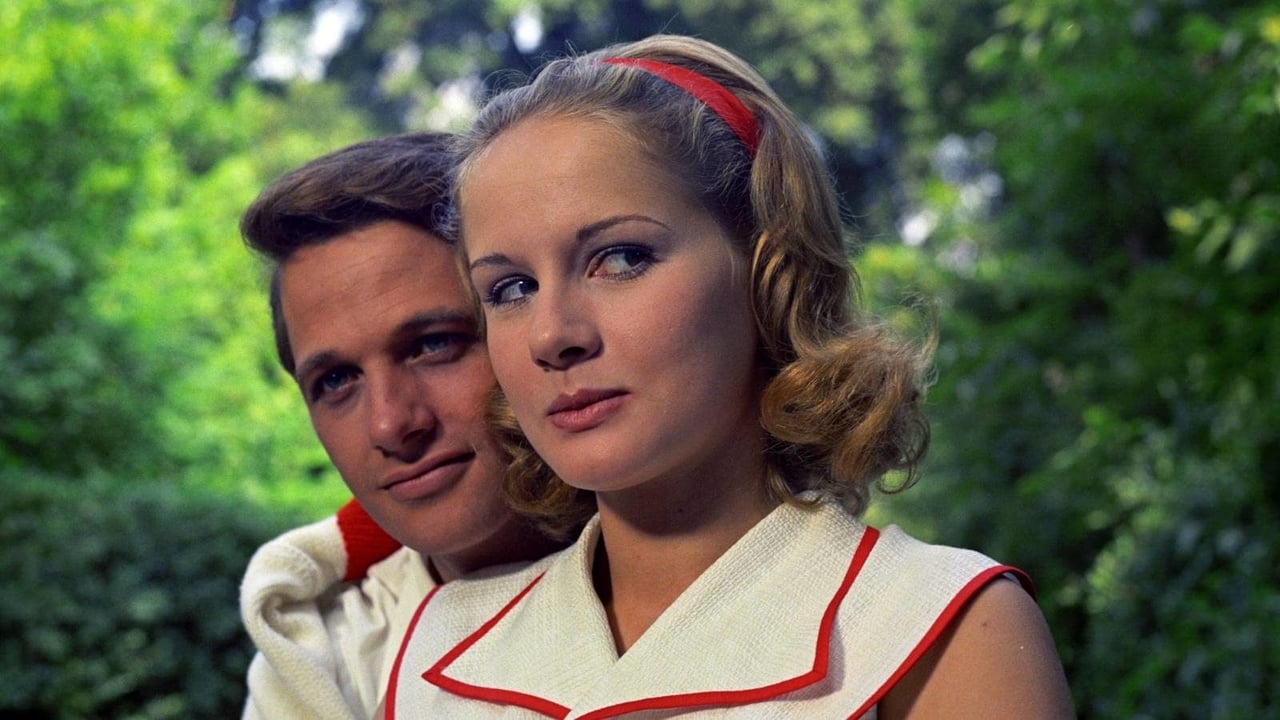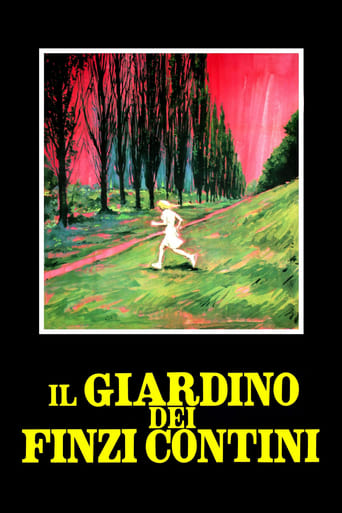

Another 70s Oscar BEST FOREIGN PICTURE victor, from the versatile Italian actor/director Vittorio De Sica, in fact this is only my second De Sica's film (after MARRIAGE Italian STYLE 1964, 8/10 and disregarding the medley BOCCACCIO '70 1962, 6/10), thus admittedly a major motivating force to watch this one is the star appeal, namely Sanda and Berger. Sanda, whom I recently discovered from Bertolucci's THE CONFORMIST (1970, 9/10), plays Micòl, the young daughter of the aristocratic Jewish Finzi-Contini family in Ferrara in the late 1930s, is the love interest of Giorgio (Capolicchio), from another Jewish but lower-class family, although they have been childhood sweethearts, Giorgio's courtship has yet come off. Meanwhile Micòl's effeminately indisposed brother Alberto (Berger) brings his burly friend Bruno (Testi) to the family and initially Micòl antagonizes him with her affected pomposity, but the ensuing happenings will dish Giorgio's hope and Micòl eventually turns out to be a token victim of the tumult and a failed attempt to dare the purity of Jewish ethnicity. As a war drama of ordinary people being shoved haphazardly by the humanity-defying heinous torrent of rabidness, the movie (maybe also Bassani's source material) obviously don't want to lay bare the ugly truth with pulverizing segments which one can generally assume would happen during the persecution of those Jews (cautiously the film finishes right before that), everything meanders with tepid temperature and sensuous palette, from jovial time on bicycle to the final illusory tennis court flashbacks (the difference between De Sica and Antonioni is immediate), but at any rate, it is wanting a bang to emanate the revelation which is always up in the air, not even the reveal of Micòl's lover with Sanda's bare-chest audacity and soul-searching stare. Like Visconti, De Sica evinces ethereal and superior beauty from his young cast, say no more to knockouts like Sanda and Berger (who is purely existed for his godsend delicacy and impeccable face), even an ordinary-looking Capolicchio and the future action star Testi, have been sculpted meticulously with soft light and fond close-ups. Valli, on the other hand, is prominent as Giorgio's father, illustrates lucidly as a spokesman for an elder generation frustrated by their fate and also impotent to save their children. As a double winner for an Oscar and a Golden Berlin Bear, it doesn't live up to my expectation, maybe it is a common attribute for Italian melodrama, its across-the-board appeal dwindles as time passes by, Visconti's SENSO (1954, 7/10) is too saccharine for my palate and this one is somewhat rather undemanding under the reigns of a maestro like De Sica.
... View MoreNo doubt this film is prettily photographed. And everyone in it is very pretty too, with their gleaming tennis whites and Sunday best dresses. For most of the movie we observe the characters dreamily cycling into one scene in a bit of this "garden" (in reality an amorphous amalgam of four private estates) and languorously cycling out, quite untroubled by bellicose drum rolls sounding off in other bits of Europe just to the north. As for clearly identifying the chief protagonists and following their fortunes, the poor viewer has a hard time trying to tell these lovely people apart one from the other. In fact, for me the only true moments of any dramatic force in the film occurs in the last scene in the dark toned schoolroom, leagues away from the dazzling sun. Out of the whole film, it is only here that tense emotions truly grip the audience with any convincing force. But this is too little, too late. De Sica has wasted too much filmic time presenting us with bloodless ciphers in his candy floss world for us to give a tinker's cuss for these folks and their final dire outcome.
... View MoreThe film, to me, is about survival of one's identity. Micol identifies with her childhood and could not let go of it in relation to her childhood sweetheart, Georgio, even while her physical desires develop and intrude. The conflict in her mind is exposed by her enticing Georgio but turning cold when he makes the moves on her. She said she could not breath. Similar to what happened to the Jews of Italy, they were drawn in by their identity. For the Italian Jews, they identified with the Italian civilization, thinking they were a part of it. Georgio identifies with Micol. As the Jews were slowly extracted from theirs, they kept on with those early ideas. Same with Georgio, he kept on with pursuing her. Then finally when he saw she had sex with someone completely different from him and her---and she even turns the light on to show him---he snaps out of it. He finally grasps the physial reality of the situation. The process is just as his father says: better you die (your relationship with Micol, your identity as being part of her world and visa versa) young and hence you have more time to start from zero. And for the Jews: better your notions of being part of the civility of Italian society die early so you have time to rebuild elsewhere.The others in the garden didn't die in time and so became unwilling prisoners, in contrast to their voluntary enprisonment behind the walls of their own estate. Once in prison, Micol finally behaves as a responsible, caring adult, but alas, too late.Prior to that, while in France, Georgio was told of the Nazi horrors and how one man escapes by shedding his identity and saying he has converted to Nazism. Georgio says he won't escape because he had too many ties back in Italy. His identity then was bound to the fantasy of the Jews in the garden, even though his realistic father says they are not his type.Survival of one's identity has been the cause of much suffering when outside, physical, uncontrollable reality intrudes. Unfortunately, the identity we construct in order to feel a sense of belonging which gives us a sense of power, often subtracts from a balanced, caring, and even civilized way. As a result, religious, nationalist conflicts have caused too much suffering to justify the gains offered by these simple-minded (childish?) views.
... View MoreOne of the most celebrated foreign films in history, "The Garden of the Finzi-Contini" has been re-released so that people who missed it in 1971 can see the film restored as it was originally meant to be viewed -- then ask themselves WHAT WAS ALL THE FUSS ABOUT!!!!!This film recounts the fall of a Jewish family during Mussolini's rise in Italy during World War II. The story follows Giorgio as he tries to surf outside his social class and win over the cute but cold-as-ice Micol. He fails, along with the film.This is NOT a great film. Like many period pieces, it's a stately bore. The plot and character development take forever to build any steam. Just when you begin to care a little about the characters -- the movie ends. Or, more accurately, just stops, dead in in tracks, not a single plotline resolved. Characters just disappear along the way, randomly, with no dramatic impact. It's photography was way too detached from it's subject matter until it's too late. In the end, too frustrating to be entertaining and too boring to be thought-provoking.THE GARDEN OF THE FINZI-CONTINIS holds its audience at arm's length. As a result, Giorgio's romantic plight, which occupies considerable screen time, has a limited emotional impact. Since we never really get close to him, aspects of the movie are less compelling than they might otherwise have been. The film's often-detached perspective allows us to focus more clearly on presentation and issues, but at the expense of caring about the characters.DeSica directed many masterpieces but this film does not qualify as a masterpiece nor does it stand the test of time.
... View More